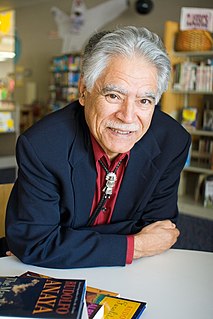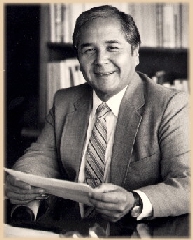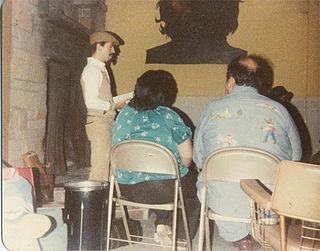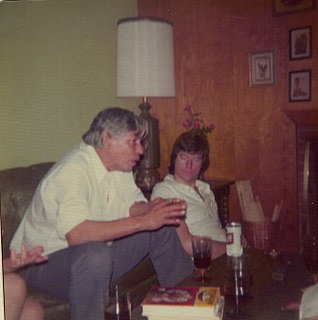Related Research Articles

Rudolfo Anaya was an American author. Noted for his 1972 novel Bless Me, Ultima, Anaya was considered one of the founders of the canon of contemporary Chicano literature. The themes and cultural references of the novel, which were uncommon at the time of its publication, had a lasting impression on fellow Latino writers. It was subsequently adapted into a film and an opera.

Gloria Evangelina Anzaldúa was an American scholar of Chicana cultural theory, feminist theory, and queer theory. She loosely based her best-known book, Borderlands/La Frontera: The New Mestiza, on her life growing up on the Mexico–Texas border and incorporated her lifelong experiences of social and cultural marginalization into her work. She also developed theories about the marginal, in-between, and mixed cultures that develop along borders, including on the concepts of Nepantla, Coyoxaulqui imperative, new tribalism, and spiritual activism.

Tomás Rivera was a Chicano author, poet, and educator. He was born in Texas to migrant farm workers, and worked in the fields as a young boy. However, he achieved social mobility through education—earning a degree at Southwest Texas State University, and later a Doctor of Philosophy degree (PhD) at the University of Oklahoma—and came to believe strongly in the virtues of education for Mexican-Americans.

Alberto Baltazar Urista Heredia, better known by his nom de plume Alurista, is a Chicano poet and activist.
Alicia Gaspar de Alba is an American scholar, cultural critic, novelist, and poet whose works include historical novels and scholarly studies on Chicana/o art, culture and sexuality.

Juan Felipe Herrera is a poet, performer, writer, cartoonist, teacher, and activist. Herrera was the 21st United States Poet Laureate from 2015 to 2017.
Ronald Francis Arias is a former senior writer and correspondent for People magazine and People en Español. He is also a highly regarded author whose novel The Road to Tamazunchale has been recognized as a milestone in Chicano literature.

José Antonio Villarreal was an American Chicano novelist. Villarreal was born in 1924 in Los Angeles, California, to migrant Mexican farmworkers. Like Juan Manuel Rubio in Pocho, Villarreal's father fought with Pancho Villa in the Mexican Revolution. He spent four years in the Navy before attending the University of California at Berkeley in 1950.
Leroy V. Quintana is an American poet, and Vietnam Veteran.
Carolyn Leilani Yu Zhen Lau is an American poet.

Francisco Xavier Alarcón was a Chicano poet and educator. He was one of the few Chicano poets to have "gained recognition while writing mostly in Spanish" within the United States. His poems have been also translated into Irish and Swedish. He made many guest appearances at public schools so that he could help inspire and influence young people to write their own poetry especially because he felt that children are "natural poets."
Tino Villanueva is an American poet and writer. His early work was associated with the Chicano literary renaissance of the 1960s and 1970s, and Villanueva is considered to be a primary figure in that literary movement. More recently, Villanueva's work has treated themes from Greek mythology.

Andrés Montoya was a Chicano poet.
Graciela Limón is a Latina/Chicana novelist and a former university professor. She has been honored with an American Book Award and the Luis Leal Award for Distinction in Chicano/Latino Literature.
Patricia Santana is a Latina American novelist.
Maria Espinosa is an American novelist, poet, and translator.
Hispanic and Latino women in America have been involved in journalism for years, using their multilingual skills to reach across cultures and spread news throughout the 19th century until the common era. Hispanic presses provided information important to the Hispanic and Latin American communities and helped to foster and preserve the cultural values that remain today. These presses also "promoted education, provided special-interest columns, and often founded magazines, publishing houses, and bookstores to disseminate the ideas of local and external writers."
Chicana literature is a form of literature that has emerged from the Chicana Feminist movement. It aims to redefine Chicana archetypes in an effort to provide positive models for Chicanas. Chicana writers redefine their relationships with what Gloria Anzaldúa has called "Las Tres Madres" of Mexican culture by depicting them as feminist sources of strength and compassion.
This is a Mexican American bibliography. This list consists of books, and journal articles, about Mexican Americans, Chicanos, and their history and culture. The list includes works of literature whose subject matter is significantly about Mexican Americans and the Chicano/a experience. This list does not include works by Mexican American writers which do not address the topic, such as science texts by Mexican American writers.
Carmen Leon is an American painter and teacher known for her work in the Watsonville, Santa Cruz area.
References
- ↑ Alma Luz Villanueva Summary – via www.bookrags.com.
- ↑ "Archived copy". Archived from the original on 2012-02-24. Retrieved 2009-11-02.
{{cite web}}: CS1 maint: archived copy as title (link) - ↑ "Alma Luz Villanueva". Poets & Writers.
- ↑ "Chicano/Latino Literary Prize - History". www.humanities.uci.edu.
- ↑ "Archived copy". Archived from the original on 2010-01-26. Retrieved 2009-11-12.
{{cite web}}: CS1 maint: archived copy as title (link)